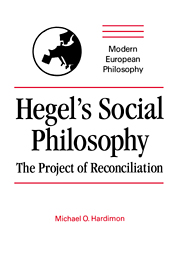Book contents
- Frontmatter
- Contents
- Acknowledgments
- List of abbreviations
- Introduction
- Part I An approach to Hegel's project
- Part II The project of reconciliation
- 4 The anatomy of the project
- 5 Individuality and social membership
- 6 The family, civil society, and the state
- 7 Divorce, war, and poverty
- Conclusion
- Selected bibliography
- Index
5 - Individuality and social membership
Published online by Cambridge University Press: 10 December 2009
- Frontmatter
- Contents
- Acknowledgments
- List of abbreviations
- Introduction
- Part I An approach to Hegel's project
- Part II The project of reconciliation
- 4 The anatomy of the project
- 5 Individuality and social membership
- 6 The family, civil society, and the state
- 7 Divorce, war, and poverty
- Conclusion
- Selected bibliography
- Index
Summary
We saw in the preceding chapter that Hegel's project of reconciliation revolves around his conception of the relation of individuality and social membership. He maintains that the modern social world is a home because it makes it possible for people to actualize themselves both as individuals and as social members. Part of the project of showing the modern social world to be a home consists in demonstrating that its central social institutions are organized so as to make it possible for people to actualize themselves in both of these ways. This task will be taken up in the next chapter. Another part of the project of showing the modern social world to be a home consists in the task of demonstrating the theoretical possibility of being both an individual and a social member. The present chapter takes up this logically prior task.
One might wonder why establishing the compatibility of individuality and social membership is necessary. Isn't it obvious that modern people are both individuals and social members? Each modern person is, after all, a distinct human being who participates in the social world. And so isn't it also obvious that individuality and social membership can be combined? Why is there an issue here?
Not the least reason is that there is a natural tendency to think that individuality and social membership cannot be combined, or, in any case, that there is a basic tension between them. One might think that individuality is properly understood as ‘atomic individuality’, that ‘who one is’ as an individual is to be identified with ‘who one is’ apart from one's social roles, and so take one's social roles to be external to one's individuality.
- Type
- Chapter
- Information
- Hegel's Social PhilosophyThe Project of Reconciliation, pp. 144 - 173Publisher: Cambridge University PressPrint publication year: 1994
- 1
- Cited by



